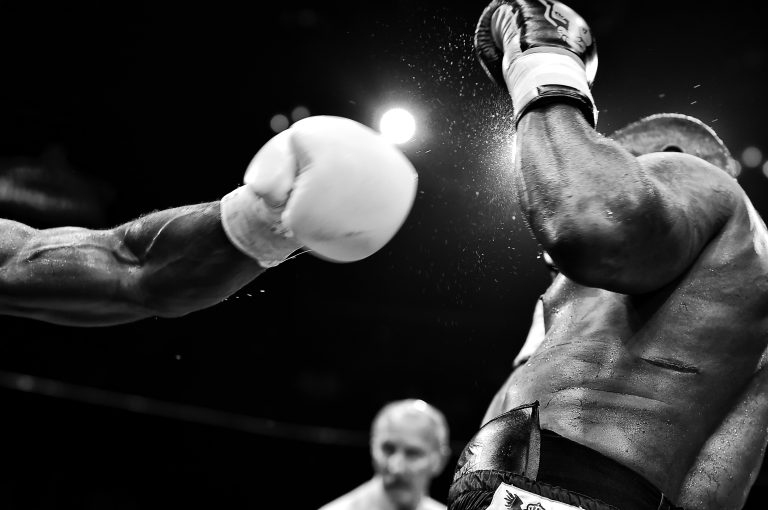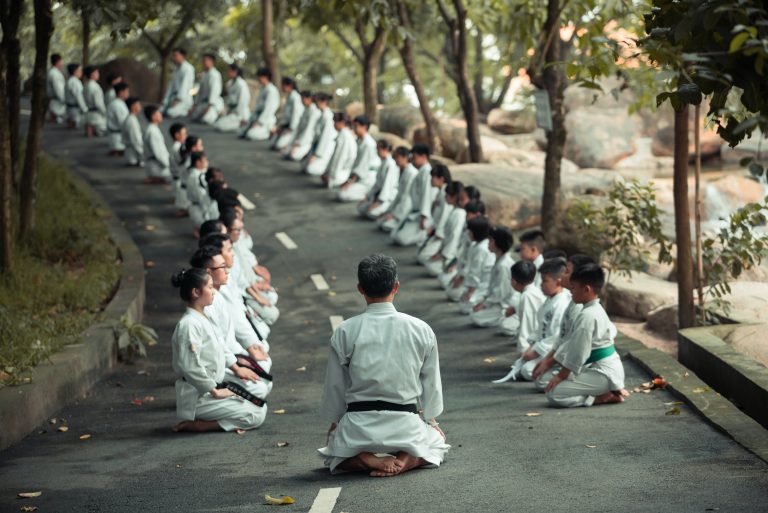Karate-Training für mehr Selbstbewusstsein: Die 10 besten Übungen
Karate ist mehr als nur eine Kampfkunst. Es ist eine Lebensweise, die Disziplin, Respekt und Selbstbewusstsein fördert. Besonders für Frauen kann Karate-Training eine großartige Möglichkeit sein, Selbstverteidigungsfähigkeiten zu erlernen und das Selbstbewusstsein zu stärken. In diesem Blogartikel stellen wir die 10 besten Übungen vor, die dazu beitragen können, das Selbstbewusstsein durch Karate-Training zu erhöhen.
1. Grundhaltung
Die richtige Grundhaltung ist beim Karate-Training von entscheidender Bedeutung. Eine stabile Position gibt Sicherheit und stärkt das Selbstbewusstsein. Es hilft, eine aufrechte Körperhaltung einzunehmen und die Füße parallel zueinander zu positionieren.
2. Fauststoß-Übung
Fauststoß-Übung ist eine der besten Übungen, um die Kraft und Sicherheit der Schläge zu verbessern. Ziel ist es, mit der Faust auf ein Kissen oder Boxsack zu schlagen.
3. Schlagkombinationen
Schlagkombinationen erlauben es, verschiedene Schlagtechniken miteinander zu verbinden. Eine gute Kombination baut Selbstbewusstsein auf und verbessert die Reflexe.
4. Tritt-Übungen
Tritt-Übungen helfen dabei, die Balance und den Fokus zu verbessern. Eine gute Möglichkeit, die Technik zu üben, ist das Treten auf Kissen oder Pads.
5. Blocktechniken
Blocktechniken sind eine wichtige Fähigkeit beim Karate-Training. Diese Übung hilft dabei, Angriffe abzuwehren und das Selbstbewusstsein zu stärken.
6. Geistige Konzentration
Karate-Training erfordert mentale Stärke und Konzentration. Eine gute Möglichkeit, die Konzentration zu verbessern, ist die Meditation. Ziel ist es, eine ruhige Atmosphäre zu schaffen und den Fokus auf das Wesentliche zu legen.
7. Partnerübungen
Partnerübungen helfen dabei, das Vertrauen in den eigenen Körper und die Fähigkeit zur Verteidigung zu stärken. Ziel ist es, eine gute Kommunikation mit dem Partner aufzubauen und die Technik zu verbessern.
8. Gruppentraining
Gruppentraining kann eine großartige Möglichkeit sein, das Selbstbewusstsein zu stärken. Eine Gemeinschaft von Gleichgesinnten kann eine inspirierende und motivierende Umgebung bieten.
9. Wettkampfteilnahme
Die Teilnahme an Wettkämpfen kann helfen, die Fähigkeiten des Karate-Trainings zu verbessern und das Selbstbewusstsein zu stärken. Ziel ist es, Herausforderungen zu meistern und den eigenen Fortschritt zu sehen.
10. Karate-Philosophie
Die Karate-Philosophie lehrt Disziplin, Respekt und Selbstkontrolle. Eine gute Möglichkeit, diese Prinzipien in den Alltag zu integrieren, ist das Lesen der Karate-Philosophie und das Betrachten von Kampfkunst-Filmen.
Karate-Training kann eine großartige Möglichkeit sein, das Selbstbewusstsein zu stärken und die eigene Sicherheit zu fördern. Mit diesen 10 besten Übungen können Sie Ihre Karate-Fähigkeiten verbessern und Ihr Selbstbewusstsein steigern.
Karate-Training for More Confidence: 10 Best Exercises
Karate is not only a martial art but it also has several physical and mental benefits. It is a great way to increase your self-confidence and self-defense skills. The power supply and physical training of karate can give you a greater sense of mental and physical stability, which can be applied in everyday life situations. In this blog post, we answer the top ten questions related to karate training for more self-confidence.
1. What is karate?
Karate is a traditional Japanese martial art developed in the Ryukyu Islands, which was formerly a separate kingdom but is now part of the modern-day Okinawa Prefecture in Japan. It was developed in the 19th century and has since gained popularity worldwide. It emphasizes striking techniques, including punching, kicking, knee strikes, elbow strikes, and open-hand techniques such as knife-hands, spear-hands, and palm-heel strikes. Other techniques included in karate training are throws and joint locks.
2. Why is karate training beneficial for developing self-confidence?
Karate training promotes physical fitness and mental agility. It is a great way to boost overall self-confidence and self-esteem. By pushing yourself to your physical limits, you develop mental and emotional resilience which transfers over to everyday life situations. Furthermore, training in karate provides opportunities to face and overcome challenges, which builds self-confidence and resilience against adversity.
3. How do I start practicing karate?
To get started in karate, you need to find a reputable dojo (karate school) that offers beginner classes. You should sign up for a few trial lessons to see if the dojo is a good fit for you. Karate training is usually structured with progression through different levels, so it is best to start at the beginner level.
4. How long does it take to become proficient in karate?
The time it takes to become proficient in karate varies depending on the individual’s level of dedication, frequency of training, and natural ability. Some people can become proficient in several years, while others may take a decade or more. However, it is important to focus on the journey rather than the destination, as karate is a lifelong journey of self-improvement.
5. Is karate dangerous?
Karate, like any physical activity or sport, does carry some risks. However, with proper training and supervision, the risk of injury can be minimized. It is important to follow the safety guidelines provided by your dojo, wear proper protective gear, and warm up properly before training.
6. What are the physical benefits of karate training?
Karate is an excellent way to improve physical fitness. It is a total-body workout that improves cardiovascular health, muscle strength, balance, and flexibility. Additionally, karate training can help with weight loss and body fat reduction.
7. What are the mental benefits of karate training?
Karate training promotes mental agility and emotional control. It is a great way to reduce stress and increase focus and concentration, which can be applied to everyday life situations. Additionally, karate training promotes discipline, respect, and responsibility, which are valuable life skills.
8. How does karate training improve self-defense skills?
Karate training emphasizes striking techniques, throws, and joint locks that can be used for self-defense purposes. Through karate training, you develop the ability to read body language and react quickly and effectively in dangerous situations. Furthermore, karate training promotes awareness and self-confidence, two vital components of self-defense.
9. Can karate training be practiced by individuals of all ages and fitness levels?
Yes, karate training can be practiced by individuals of all ages and fitness levels. There are programs tailored to children, adults, and seniors. Moreover, karate training can be modified to accommodate different fitness levels and physical limitations.
10. What are some key exercises for karate training for developing self-confidence?
There are various exercises that can be included in a karate training program for developing self-confidence. Here are ten of the best exercises:
- Kata drills- a sequence of techniques performed in a specific pattern in a solo fashion.
- Kumite drills- focused on sparring and can be practiced with a partner.
- Makiwara training- hitting a solid board or post that offers resistance to strengthen punches.
- Abs conditioning- helps strengthen the core and improve body composition.
- Agility drills- include jumping, balancing, and coordination exercises to improve overall fitness.
- Pushups-since upper body fitness is very important for karate.
- Squat jumps- helps to develop explosiveness, a fundamental karate trait.
- Shadow Boxing- It help in building muscular endurance and increase power and speed.
- Interval training- combines high-intensity exercises with rest intervals to improve cardiovascular fitness.
- Visualization exercises- helps to improve focus and visualization of proper technique during training.
In conclusion, karate training is a great way to increase your self-confidence and develop valuable physical and mental skills. By following the guidelines provided by your dojo and focusing on the journey rather than the destination, you can reap the benefits that come with karate training. Incorporating the above exercises into your training regimen can help you achieve your goals and develop greater self-confidence.
Inhaltsverzeichnis






